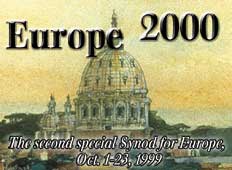European Synod
II
Few details, but a message of
hope
By JOHN L. ALLEN JR.
At the close of the second European synod of the 1990s, the bishops
gathered in Rome did not offer any dramatic new gestures to address
the crisis of faith that they began their three weeks here by
lamenting.
It’s not that no one had any ideas. Within the small groups
organized by language, some participants urged ordaining married men
in order to respond to Europe’s severe shortage of priests (in
1995 there were 46,879 parishes in Europe which had no resident
priest, as against 39,242 in 1976. In many dioceses by the year 2000,
between 30 and 50 percent of parishes will have no resident priest.)
Others urged allowing wider use of general absolution, a form of
reconciliation administered in groups rather than individually, in
order to invite people back to the sacrament. Still others suggested a
revision of the church’s discipline on divorce and civil
remarriage (one in every three marriages in the developed world ends
in divorce).
One group called for appointing women to head curial agencies, a
move that could have vast symbolic value for an institution often
perceived as a “boy’s club.”
According to synod sources, however, none of these ideas made the
set of propositions offered to the pope as the raw material for the
document that he is expected to issue sometime next year. That
document will represent the formal conclusions of the synod.
The propositions are not released to the press - ostensibly to
protect the independence of the pope’s judgment - but sources in
the synod told reporters that the most controversial items did not
survive the final cut.
There was some last minute wrangling on celibacy. The bishops
apparently removed a sentence that said ordaining married men is not a
solution to the priest shortage.
The bishops also revised a line that called celibacy “not
merely a discipline” but a “consequence” of the
theology of priestly ministry, sources said. The final proposition
described celibacy as “suitable” to this theology.
In general, however, the most controversial items were watered down
or eliminated. The propositions will apparently, for example, retain a
line calling for women to be considered for all church offices “for
which there is no theological obstacle” - but there will be no
specific mention of heading departments in the curia.
While consensus on specifics may have been elusive, the bishops were
able to agree that their final “message” to the world needed
to be positive. Thus the 3600-word document manages to use some form
of the word “hope” 58 times.
“Enlightened by faith in Jesus Christ, with humble certainty,
we know that we are not deceiving you when we say that hope is
possible even today and that it is possible for all,”
the message reads. “In his fatherly love, God denies no one this
possibility, for he desires the full happiness of all.”
Hope flows from the risen Christ, the bishops said. “Our life
has meaning, communion is possible, diversity can become richness, and
the power of the Kingdom is at work in history and helps to build the
city of mankind. Love gives an eternal value to human efforts.
Suffering becomes salvific, life will conquer death, creation will
share in the glory of the children of God.”
The bishops pointed to signs of hope both in the church and in the
broader European society. These signs in the church included the
witness of martyrs from Eastern Europe, the new ecclesial movements -
such as Focolare, Communion and Liberation, and the Neocatechumenate -
and “the growing presence and activity of women in the structures
and life of the Christian community.”
In Europe, the signs included openness of peoples to one another,
reconciliation between traditional enemies, European unity and the
emergence of a European consciousness, the growth of democracy and
growing respect for human rights.
The bishops seemed united in their support for European unity, a
position seen here as significant in the face of recent gains by in
both Austria and Switzerland by parties running on an anti-unification
platform.
“As Christians, we wish and we invite you to be committed
Europeans, ready to make our contribution to the Europe of
today and tomorrow, treasuring the precious heritage left us by the ‘founding
fathers’ of a united Europe,” the bishops said.
The bishops also called upon Europeans to be committed to the
welfare of the entire world. In this context, they issued a call for
debt reduction in the Third World. They called on Catholics to “welcome
the appeal which, with the Holy Father, we renew, to wipe out
or at least reduce the International Debt of developing nations, as
some countries have already done.”
National Catholic Reporter, October 25, 1999
|



